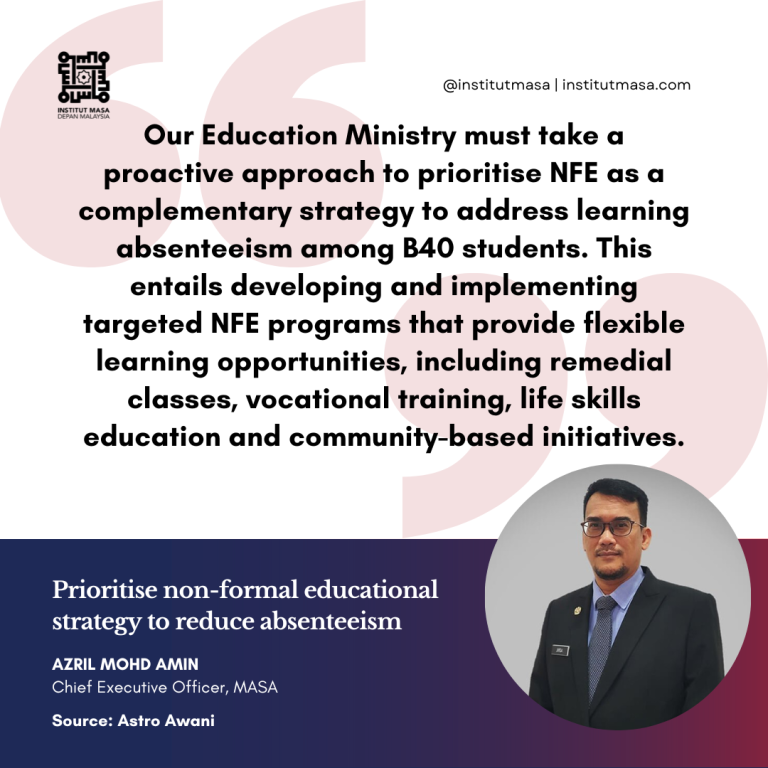By Azril Mohd Amin
THE recent release of the World Bank Malaysia’s report titled “Bending Bamboo Shoots: Strengthening Foundational Skills” should serve as a wake-up call for all Malaysians. It sheds light on the concerning state of early education in Malaysia, revealing significant gaps despite substantial investment in the sector, amounting to 3.2 per cent of the Gross Domestic Product (GDP).
According to the report, only 58 per cent of Malaysian students are proficient in reading by the end of Year 5, lagging far behind other regional counterparts like Vietnam. Additionally, despite spending an average of 12.5 years in school, Malaysian students’ learning outcomes are equivalent to only 8.9 years of education.
The report identifies several contributing factors to this situation, including limited access to quality early childhood education, inadequate facilities, insufficient teacher readiness and expertise and a lack of monitoring practices for student performance. Addressing these challenges promptly is crucial if Malaysia aims to achieve its goal of becoming a developed nation by 2030.
These findings resonate with and corroborate the contents of the Policy brief entitled “Education Plan to Address School Dropouts in Malaysian Primary and Secondary Schools,” collaboratively conducted by Institut Masa Depan Malaysia (MASA) and a research team from the National University of Malaysia (UKM) in 2022, led by Associate Professor Dr. Bity Salwana Alias and other experts.
The MASA-UKM study found that between 10 and 20 per cent of students frequently skipped school in the 19 schools surveyed, with the majority lacking proficiency in the 3M (reading, writing and arithmetic) skills.
Despite the implementation of compulsory primary education policy since 2003 and various efforts to attract students to school, the phenomena of school dropout and learning deficits remain inadequately addressed.
The study also underscores the need for stronger collaboration between the Ministry of Education Malaysia (KPM), the Ministry of Women, Family and Community Development (KPWKM), communities and other relevant stakeholders to tackle this increasingly concerning issue.
Moreover, the MASA-UKM study highlights parental apathy towards education as a significant factor contributing to absenteeism, exacerbated by economic hardship, transportation issues and the need for children to work or care for siblings. Student attitudes, teacher practices, administrative policies, community involvement, and curriculum relevance were also identified as contributing factors to student disengagement from education.
Statistics from the Examination Board regarding student absenteeism in exams, including 10,681 students skipping the SPM exam in 2021, as also referred to in the MASA-UKM study.
In Malaysia, the issue of learning absenteeism, particularly among students from low-income households (B40), poses a significant barrier to achieving equitable education outcomes.
While formal education remains the cornerstone of the education system, there is a growing recognition of the need to supplement it with Non-Formal Education (NFE) programs tailored to the specific needs of marginalised children.
Drawing upon international references and best practices from other countries, it becomes evident that NFE can play a pivotal role in addressing learning absenteeism and empowering B40 students to succeed academically.
According to the United Nation Educational Scientific and Cultural Organisation (UNESCO), NFE refers to any organised educational activity that takes place outside the formal schooling system.
These programs are flexible, learner-centred and often target marginalised populations, including out-of-school children, dropouts and those who face barriers to accessing formal education. By providing alternative pathways to learning, NFE programs offer a lifeline to students who may have otherwise fallen through the cracks of the education system.
The Convention on the Rights of the Child (CRC), ratified by Malaysia in 1995, emphasises the right of every child to education and underscores the importance of ensuring that education is accessible to all without discrimination. Furthermore, United Nations resolutions, such as the Sustainable Development Goals (SDGs), specifically SDG 4 on Quality Education, call for inclusive and equitable education for all, including marginalised groups.
Several countries have successfully implemented NFE programs to address learning absenteeism and promote educational inclusion. For example, in India, the National Institute of Open Schooling (NIOS) offers flexible learning opportunities for out-of-school children and dropouts, allowing them to complete their education through distance learning and vocational training programs.
In Brazil, comprehensive NFE initiatives are introduced to address educational disparities and promote social inclusion. Its Literacy Movement Program targets illiterate and low-literate adults, providing literacy classes and educational materials in community settings.
The involvement of civil society organisations (CSOs) is instrumental in the success of NFE programs. CSOs bring valuable expertise, resources, and community connections to the table, enabling them to reach marginalised populations effectively. Collaborative efforts between government agencies, NGOs, community groups, and other stakeholders can ensure that NFE programs are tailored to the specific needs of B40 students and are responsive to local contexts.
Our Education Ministry must take a proactive approach to prioritise NFE as a complementary strategy to address learning absenteeism among B40 students. This entails developing and implementing targeted NFE programs that provide flexible learning opportunities, including remedial classes, vocational training, life skills education and community-based initiatives.
They should also collaborate closely with CSOs to leverage their expertise and resources in reaching marginalized communities. NFE programs should adhere to international standards of quality and equity as outlined in UNESCO’s guidelines on Non-Formal Education. This includes ensuring that NFE instructors are adequately trained, curriculum content is relevant and culturally sensitive and learning environments are conducive to student engagement and participation.
By prioritising NFE and engaging civil society organisations, Malaysia can make significant strides towards addressing learning absenteeism among B40 students and promoting educational inclusion.
It is, therefore, imperative upon the ministry to take its responsibility seriously, with the support and assistance of all relevant parties, to ensure that no child is left behind in the pursuit of quality education and lifelong learning opportunities.
